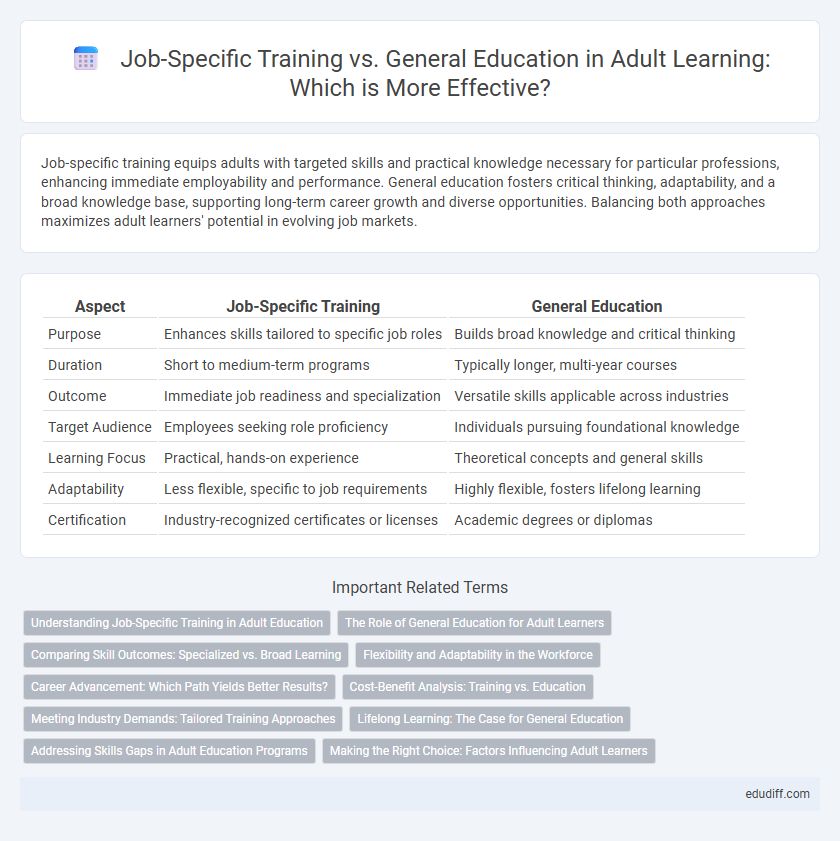Job-specific training equips adults with targeted skills and practical knowledge necessary for particular professions, enhancing immediate employability and performance. General education fosters critical thinking, adaptability, and a broad knowledge base, supporting long-term career growth and diverse opportunities. Balancing both approaches maximizes adult learners' potential in evolving job markets.
Table of Comparison
| Aspect | Job-Specific Training | General Education |
|---|---|---|
| Purpose | Enhances skills tailored to specific job roles | Builds broad knowledge and critical thinking |
| Duration | Short to medium-term programs | Typically longer, multi-year courses |
| Outcome | Immediate job readiness and specialization | Versatile skills applicable across industries |
| Target Audience | Employees seeking role proficiency | Individuals pursuing foundational knowledge |
| Learning Focus | Practical, hands-on experience | Theoretical concepts and general skills |
| Adaptability | Less flexible, specific to job requirements | Highly flexible, fosters lifelong learning |
| Certification | Industry-recognized certificates or licenses | Academic degrees or diplomas |
Understanding Job-Specific Training in Adult Education
Job-specific training in adult education targets the precise skills and knowledge required for particular occupations, enabling learners to perform job tasks efficiently and meet industry standards. This focused approach contrasts with general education, which provides broad theoretical foundations but may lack immediate practical application in professional settings. Emphasizing competencies such as technical proficiency, regulatory compliance, and hands-on experience enhances employability and supports career advancement in specialized fields.
The Role of General Education for Adult Learners
General education provides adult learners with critical thinking, communication, and problem-solving skills that support adaptability across various job markets. It fosters lifelong learning habits essential for career advancement and personal development beyond specialized training. Emphasizing foundational knowledge equips adults to navigate changing industries and enhances their overall employability.
Comparing Skill Outcomes: Specialized vs. Broad Learning
Job-specific training delivers targeted skills aligned with industry requirements, resulting in faster job readiness and higher proficiency in particular tasks. General education fosters critical thinking, adaptability, and broad knowledge, enabling individuals to navigate diverse career paths and evolving job markets. Comparing skill outcomes reveals that specialized training excels in technical expertise, while broad learning enhances problem-solving and long-term career flexibility.
Flexibility and Adaptability in the Workforce
Job-specific training enhances flexibility by equipping adults with targeted skills that directly address the evolving demands of their industry, enabling quicker adaptation to role changes. General education fosters broad critical thinking and problem-solving abilities, which support adaptability across various job functions and career shifts. Balancing both approaches cultivates a versatile workforce capable of navigating economic fluctuations and technological advancements.
Career Advancement: Which Path Yields Better Results?
Job-specific training equips adults with targeted skills and practical knowledge directly applicable to their current roles, resulting in faster career advancement and higher immediate employability. General education fosters critical thinking, adaptability, and broad competencies, enhancing long-term career growth and opportunities across diverse industries. Data indicates that professionals combining job-specific credentials with a solid general education background achieve superior career trajectories and salary growth.
Cost-Benefit Analysis: Training vs. Education
Job-specific training often yields immediate productivity gains by equipping employees with targeted skills, leading to a faster return on investment compared to general education. General education provides broader knowledge and critical thinking abilities that enhance adaptability and long-term career growth but may involve higher upfront costs and delayed financial benefits. Cost-benefit analysis reveals that organizations focused on short-term performance improvements prefer job-specific training, while those prioritizing versatility and innovation invest in general education.
Meeting Industry Demands: Tailored Training Approaches
Job-specific training directly addresses industry demands by equipping adults with targeted skills and practical knowledge essential for immediate workforce integration, enhancing employability and productivity. General education provides a broad foundation of critical thinking and adaptability, supporting long-term career flexibility but may lack the precision required for specialized roles. Tailored training approaches combine these elements, optimizing workforce readiness by aligning curriculum with evolving industry standards and specific job requirements.
Lifelong Learning: The Case for General Education
General education fosters critical thinking, adaptability, and broad knowledge essential for navigating evolving job markets and technological changes. Lifelong learning through general education equips adults with versatile skills that enhance problem-solving and communication across various fields. Emphasizing general education supports sustained career growth and personal development beyond immediate job-specific training.
Addressing Skills Gaps in Adult Education Programs
Job-specific training in adult education programs targets industry-relevant competencies to quickly bridge skill gaps, enhancing employability and productivity in specialized roles. General education provides foundational knowledge and critical thinking skills, supporting adaptability and long-term career growth across diverse fields. Effective adult education strategies integrate both approaches to equip learners with immediate job skills and transferable cognitive abilities, addressing workforce demands comprehensively.
Making the Right Choice: Factors Influencing Adult Learners
Job-specific training equips adult learners with targeted skills directly applicable to particular careers, enhancing immediate employability and earning potential. General education fosters critical thinking, adaptability, and foundational knowledge, supporting long-term career flexibility and personal development. Factors influencing adults' choice include current job market demands, career goals, existing skill gaps, and the need for credential recognition.
Job-specific training vs General education Infographic

 edudiff.com
edudiff.com